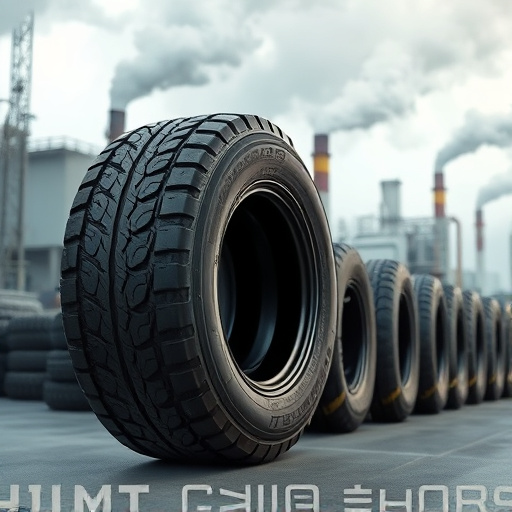
Tyre pollution, driven by factory emissions during rubber production, poses significant environmental and health risks globally. Volatile organic compounds (VOCs) like benzene and toluene, along with particulate matter (PM), contribute to poor air quality and cardiovascular diseases. Nitrogen oxides (NOx) and sulfur dioxide (SO2) exacerbate existing respiratory conditions and climate change. To combat these issues, the industry is transitioning towards eco-friendly tyres utilizing renewable resources and advanced emission control technologies. Stricter filtration systems and research into alternative rubber compounds are reducing VOCs and particulate matter, improving air quality, and safeguarding public health near production facilities.
Air pollution from tyre manufacturing poses significant health and environmental risks. This industry generates harmful substances like volatile organic compounds (VOCs) and particulate matter through various processes, including rubber production and factory emissions. Exposure to these pollutants can lead to respiratory issues, cardiovascular diseases, and other adverse health effects. Understanding the air quality impact of tyre pollution is crucial in developing effective emission control measures and promoting eco-friendly tyres as sustainable alternatives.
- Understanding Tyre Pollution and Its Environmental Impact
- The Health Risks Associated with Air Pollution from Tyre Manufacturing
- Emission Control Measures and the Shift Towards Eco-Friendly Tyres
- Mitigating Industrial Pollution: A Sustainable Approach to Rubber Production
Understanding Tyre Pollution and Its Environmental Impact

Tyre pollution is a significant environmental concern stemming from the manufacturing process of rubber products. Factories involved in tyre production release various pollutants into the air, including volatile organic compounds (VOCs) and particulate matter. These emissions contribute to poor air quality, which has profound impacts on both ecosystems and human health. VOCs, such as benzene and toluene, are known carcinogens that can cause respiratory issues, while particulate matter, especially fine particles (PM2.5), can penetrate deep into the lungs, leading to cardiovascular diseases and other chronic conditions.
The industrial pollution generated by tyre factories not only affects local communities but also has global implications. Conventional rubber production relies heavily on fossil fuels, exacerbating climate change. To mitigate these health risks and environmental impacts, manufacturers are increasingly exploring eco-friendly tyres that use renewable resources and advanced emission control technologies. Adopting such practices is crucial in moving towards a more sustainable future where air quality improves, and the health of both humans and the planet is better protected.
The Health Risks Associated with Air Pollution from Tyre Manufacturing

The air quality impact of tyre manufacturing is a significant concern, as factories emit various pollutants into the atmosphere during rubber production. Volatile Organic Compounds (VOCs) and Particulate Matter (PM) are among the main culprits, contributing to both short-term and long-term health risks. VOCs, such as benzene and toluene, are known carcinogens that can cause respiratory issues, skin irritation, and even neurological disorders when inhaled. PM, including fine particles like PM2.5, can penetrate deep into the lungs, leading to conditions like asthma, bronchitis, and heart disease.
Factory emissions from tyre production also include noxious gases like nitrogen oxides (NOx) and sulfur dioxide (SO2), which aggravate existing respiratory conditions and play a role in climate change. Moreover, exposure to these pollutants can affect workers in factories, leading to acute and chronic health issues. To mitigate these risks, the industry is increasingly focusing on eco-friendly tyres and implementing stricter emission control measures, including advanced filtration systems and cleaner production methods.
Emission Control Measures and the Shift Towards Eco-Friendly Tyres

Despite advancements in technology and a growing awareness of environmental issues, tyre manufacturing continues to contribute significantly to air pollution, posing severe health risks. Factory emissions from rubber production are a complex mix of volatile organic compounds (VOCs) and particulate matter, both of which have detrimental effects on air quality. These emissions not only impact the surrounding environment but also lead to various health complications for workers and nearby residents.
However, there is a noticeable shift towards eco-friendly tyres, driven by stringent emission control measures and consumer demand for sustainable products. Modern tyre factories are implementing advanced technologies to capture and reduce VOCs and particulate matter emissions. Additionally, research and development efforts are focused on creating rubber compounds from alternative materials, aiming to minimise industrial pollution during production. This transition is not only beneficial for the environment but also promises to lower health risks associated with tyre manufacturing.
Mitigating Industrial Pollution: A Sustainable Approach to Rubber Production

Addressing tyre pollution is paramount to mitigating the significant health risks associated with factory emissions, especially in regions surrounding rubber production facilities. These factories emit a range of pollutants, including volatile organic compounds (VOCs) and particulate matter, which contribute to severe air quality impact. The release of these chemicals not only compromises local air quality but also poses substantial health risks to nearby communities.
A sustainable approach to rubber production involves adopting eco-friendly practices and implementing stringent emission control measures. This transition can be achieved by promoting the use of eco-friendly tyres, which are designed with reduced emissions and a lower environmental footprint in mind. Additionally, factories can invest in advanced filtration systems, improve ventilation, and embrace clean energy sources. These strategies collectively help to curb VOCs and particulate matter emissions, thereby enhancing air quality and alleviating the burden on public health.
The pervasive issue of tyre pollution, stemming from both manufacturing processes and factory emissions, significantly impacts global air quality. High levels of volatile organic compounds (VOCs) and particulate matter contribute to various health risks, including respiratory and cardiovascular diseases. However, with a growing awareness of these environmental and public health concerns, there’s a notable shift towards implementing emission control measures and developing eco-friendly tyres. Sustainable practices in rubber production, coupled with stringent regulation, are crucial steps towards mitigating industrial pollution and ensuring a healthier future for communities surrounding tyre manufacturing facilities.





